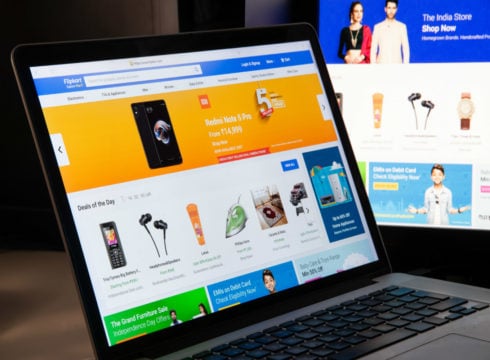SUMMARY
Flipkart plans to sell smartphones through 15K small convenience stores
It is already piloting this initiative in Telangana
Under this scheme, Flipkart delivers the phones to the stores who in turn deliver them to the users
Inc42 Daily Brief
Stay Ahead With Daily News & Analysis on India’s Tech & Startup Economy
After Reliance came up with its hybrid online-offline model to foray into ecommerce segment, now Walmart-owned Flipkart is also looking to follow the same strategy and use convenience stores for expanding its business.
According to an ET report which cited anonymous sources, the ecommerce company is planning to sell smartphones through 15K convenience stores, beauty salons, bakeries and pharmacies.
Currently, Flipkart is piloting a project in Telangana where it has partnered with around 800 stores to sell smartphones through the Flipkart app. Under this scheme, Flipkart delivers the phones to the stores from where the orders were placed. The kirana stores then deliver the products to the customers thus earning a retailer’s margin.
The sources also added that this pilot project is generating a revenue of INR 15-20 Cr per month. After recording success in the project, Flipkart is now looking to replicate the model across the country.
Flipkart is aiming to push the sales of other products through these stores and is also planning to use them as last-mile delivery agents.
Currently, this hybrid model is followed by Flipkart-owned fashion portal Myntra. Launched in 2017, Myntra uses a network of kirana stores and other small shops to fulfil its last-mile deliveries as a part of its programme called ‘Mensa Network’. The network comprises of t 9K brick-and-mortar stores which are used for providing delivery services in 50 cities.
Focus Towards Online-Offline Hybrid Model
The developments come in at a time when the ecommerce space in India is undergoing several changes owing to the draft ecommerce policy and changes in the FDI guidelines.
While the ecommerce giants Flipkart and Amazon are struggling to comply with the new rules, Mukesh Ambani-led Reliance is looking to increase the competition in the sector through its hybrid model.
In July 2018, Mukesh Ambani announced that Reliance Retail and Jio Infocomm will jointly launch a new ecommerce platform. The ecommerce plan will be beneficial to consumers, retailers and producers and will also help about 3 Cr small shopkeepers across the country.
As a part of its hybrid model, Reliance is aiming to build shared profitability by integrating offline stores of small retail players within its online platform.
Similar to Reliance, Kishore Biyani’s Future Retail also follows the hybrid model. The company had announced the launch of its Retail 3.0 business model called “Tathaastu”, which operated on a combined system of digital and brick and mortar stores.
Biyani, who believes that the online model cannot survive in India without offline support, aims to make the company Asia’s largest integrated consumer retailer by 2047 with a revenue of $1 Tn (INR 71.76 Lakh Cr) using this hybrid model.
In September 2018, fashion retailer V-Mart Retail had also announced its plans to adopt the hybrid model with new stores and a warehouse.
Note: We at Inc42 take our ethics very seriously. More information about it can be found here.


